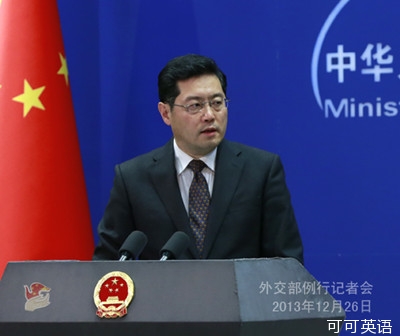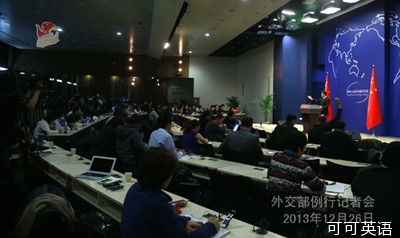2013年12月26日,外交部發言人秦剛主持例行記者會。
Foreign Ministry Spokesperson Qin Gang held a press conference on December 26, 2013.
問:日本首相安倍晉三今日參拜靖國神社后稱,他參拜是為了向為國家戰斗和犧牲的英靈致以哀悼之意,日本的和平繁榮建立在他們的犧牲基礎之上。安倍還稱戰后日本建立了自由、民主的國家,一直堅持和平發展道路,將繼續為世界和平、穩定和繁榮履行責任。中方對此有何評論?
Q: Japanese Prime Minister Shinzo Abe said after his visit to the Yasukuni Shrine that he was to express condolence to those departed who fought and died for their country and that the peace and prosperity Japan enjoys is based on their death. Abe further claimed that Japan became a country of freedom and democracy that adhered to peaceful development after WWII and that it would keep fulfilling its obligation to world peace, stability and prosperity. What is China's comment?
答:關于日本軍國主義發動的那場侵略戰爭,歷史早有定論。請問,那些戰場上倒下的日本軍人為誰而死?靖國神社供奉的二戰甲級戰犯為什么要受到正義的審判?建立在他們基礎上的和平與繁榮到底是什么樣的和平與繁榮?日本領導人說出這樣的話,完全是陽奉陰違,顛倒黑白,混淆視聽。日本一些政客一方面把民主、自由、和平掛在嘴上,另一方面為軍國主義揚幡招魂,美化對外侵略和殖民歷史,這恰恰是褻瀆了民主、自由與和平。
A: History has already come to a conclusion on the war of aggression waged by the Japanese militarism. Who did the Japanese soldiers die for on the battlefield? Why should the Class-A Second World War criminals enshrined in the Yasukuni Shrine be subject to just trials? What kind of peace and prosperity is built upon their death? What the Japanese leader said is completely duplicity which confuses right and wrong and misleads the public opinion. Some Japanese politicians, on one hand pay lip service to democracy, freedom and peace, on the other hand, call back the ghost of militarism and whitewash Japan's history of aggression and colonialism. This is precisely an affront to democracy, freedom and peace.
我們必須指出,軍國主義陰魂不散,沒有勇氣正視歷史,不敢對歷史負責,公然挑戰歷史正義和人類良知,挑戰二戰結果和戰后國際秩序,有什么資格談論自由與民主?有什么資格為世界和平與繁榮履行責任?
We must make it clear: for those who are under the evil influence of militarism, who have no courage to face up to history and take responsibility and who blatantly challenge historical justice and human conscience and defy the outcome of WWII and the post-war international order, what entitles them to talk about freedom and democracy? How can they fulfill the obligation to world peace and prosperity?

問:第一,中國副總理劉延東取消了今天下午會見日中友好議員聯盟的活動,這是否是對安倍晉三參拜靖國神社的抗議?第二,中方除抗議外還將采取什么措施?
Q: First, Chinese Vice Premier Liu Yandong cancelled her meeting with the Association of Dietmen League for Japan-China Friendship. Is this a protest against Abe's visit to the Yasukuni Shrine? Second, what other measures will China adopt other than protest?
答:你提到的這兩個問題,我一并作答:安倍參拜靖國神社破壞了中日關系的政治基礎,也為兩國關系改善和發展制造了新的嚴重障礙,日方將要為此承擔所產生的一切后果。
A: You raised two questions and I will answer them together. Abe's visit to the Yasukuni Shrine jeorpardizes the political foundation of China-Japan relations and erects new barriers to the improvement and growth of bilateral relations. The Japanese side must take all the consequences arising therefrom.
問:安倍晉三在參拜靖國神社后稱,他對參拜靖國神社已成為政治和外交問題感到遺憾,他完全沒有傷害中、韓人民感情的想法,希望對中、韓懷著敬意,構建友好關系。中方對此有何評論?
Q: After his visit to the Yasukuni Shrine, Abe expressed regret that visiting the shrine has become a political and diplomatic issue. He said that he utterly had no intention of offending the Chinese and ROK people, rather, he wants to build friendly relations with China and ROK with respect. What is China's comment?
答:我要指出,靖國神社問題的實質是日本能否正確認識和深刻反省日本軍國主義侵略歷史。它事關日本與亞洲鄰國的關系,事關中日關系政治基礎,事關二戰結果和戰后國際秩序,事關亞洲乃至世界的和平與穩定。我還要指出,日本政府和領導人在歷史問題上是作出過表態和承諾的。安倍參拜,嚴重違背中日四個政治文件的原則和精神,這當然是政治和外交上的大是大非問題。
A: I want to point out that the issue of the Yasukuni Shrine, in nature, is about whether Japan can adopt a correct view of and repent the history of aggression by the Japanese militarism. It concerns Japan's ties with its Asian neighbors, the political foundation of China-Japan relations, the outcome of WWII and the post-war international order and the peace and stability of Asia and beyond. I also want to point out that Japanese administrations and leaders have made statements on and commitments to the issue of history. Abe's visit grossly violates the principle and spirit of the four political documents between China and Japan. It is undoubtedly a major political and diplomatic issue of right and wrong.
如果安倍真的對鄰國懷有敬意,真心想改善同亞洲鄰國的關系,他就不應該去靖國神社,而應該去侵華日軍南京大屠殺遇難同胞紀念館。日本只有真正做到以史為鑒,它同亞洲鄰國的關系才有未來。
If Abe truly respects Japan's neighbors and really wants to improve relations with Asian neighbors, he should go to the Memorial Hall for Compatriots Killed in the Nanjing Massacre by Japanese Forces of Aggression, rather than the Yasukuni Shrine. Only if Japan truly regards history as a mirror can it has a future in its relations with its Asian neighbors.

問:中方是否考慮召回駐日大使?
Q: Does China consider recalling the Chinese Ambassador to Japan?
答:關于安倍參拜靖國神社,中方將在北京和東京分別向日方提出嚴正交涉和強烈抗議。
A: Regarding Abe's visit to the Yasukuni Shrine, China will lodge solemn representations with and strong protest against the Japanese side in Beijing and Tokyo.
問:今天是毛澤東主席誕辰120周年紀念日。中方對日本領導人選擇在這一特殊時間參拜有何回應?
Q: We commemorate Chairman Mao Zedong's 120th birthday today. What is China's response to the Japanese leader's visit to the Yasukuni Shrine on such a particular day?
答:今天是毛澤東同志誕辰120周年紀念日。此時此刻,我們特別想起在1938年中國人民抗日戰爭正處在艱苦卓絕的時候,毛澤東同志在《論持久戰》的演講中說:中國是大國,進步、多助,最后的勝利屬于中國。
A: Today marks the 120th birthday of Chairman Mao Zedong. This very moment reminds us of the year 1938 when the Chinese people were fighting arduously against the Japanese invasion. Comrade Mao Zedong said in his speech On Protracted War: China is a very big country. There is broad international support for China stemming from the progressive and just character of her war. The final victory will go to China.
更多精品翻譯素材,敬請關注可可英語。











